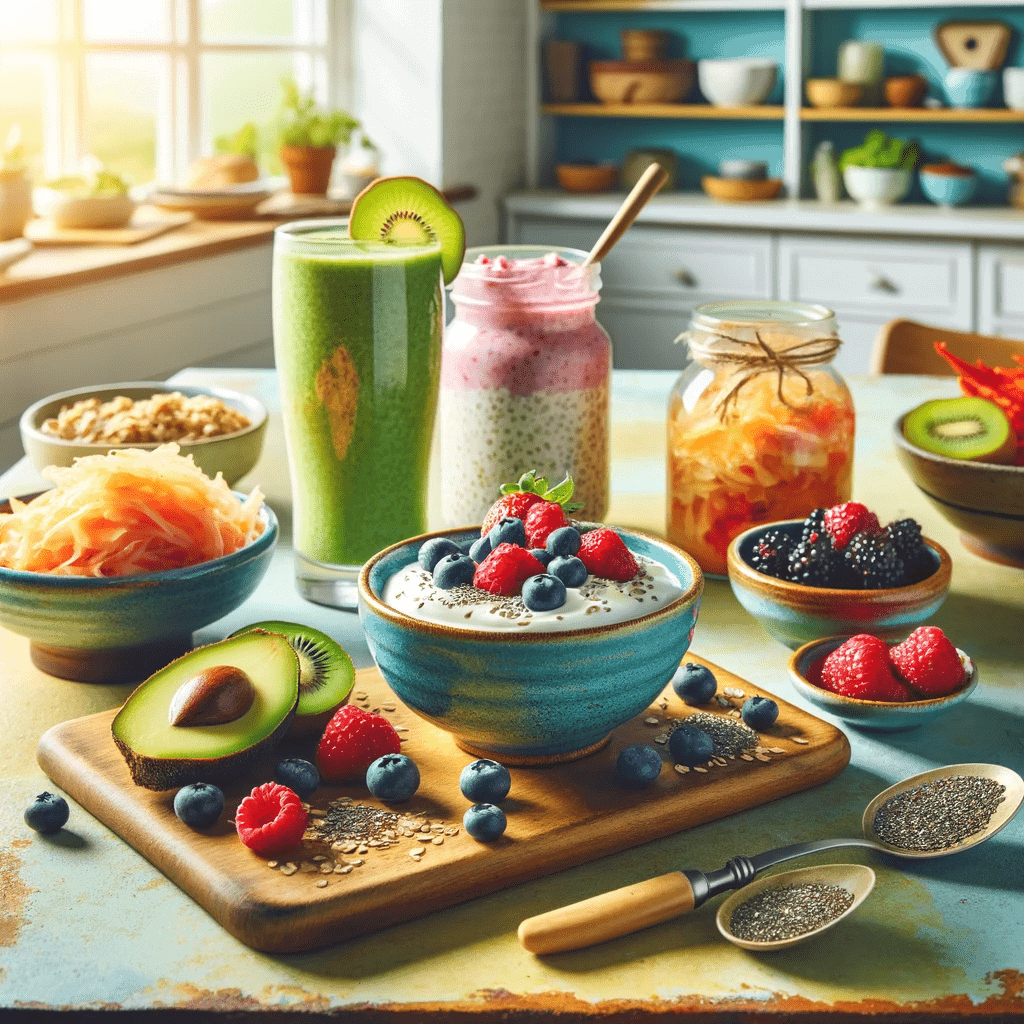Starting your day with the best breakfast for gut health can have positive life-long implications. You’ve likely heard the buzz about digestive health, but might not know where to begin when it comes to meals that nurture your microbiome. That’s what we’ll dive into this post.
Is Breakfast the Most Important Meal of the Day?
You’ve likely heard the saying that breakfast is the most important meal of the day, but is there truth to this widely accepted concept? The answer is a resounding yes, especially when it comes to supporting your gut health. The significance of a nutritious breakfast for kick-starting your digestive system and nourishing your microbiome.
A healthy morning routine sets the tone for your day. Starting with a balanced diet can help regulate blood sugar levels and prevent mid-morning cravings. Nutrition experts suggest that the best breakfast for gut health should include a mix of fiber, protein, and healthy fats to support the gut and overall well-being.
While some argue that skipping breakfast can lead to weight loss, research suggests it may actually slow down metabolism and lead to overeating later in the day. On the contrary, those who consume a healthy breakfast are more likely to have better micronutrient intake and less likelihood of developing chronic diseases.
It’s important to customize your breakfast according to your nutritional needs. Consider these factors:
- Personal Activity Level: More active individuals may need a higher caloric intake.
- Health Goals: Weight loss or muscle gain may require different macronutrient balances.
- Personal Taste Preferences: Enjoying your breakfast is important for maintaining a regular eating pattern.
Remember, it’s not just about eating anything in the morning; it’s about choosing the right foods that promote gut health and provide sustained energy. The key is to listen to your body’s needs and find a breakfast plan that works for you, keeping variety and balance at the forefront.
Breakfast Now and Then
History of Cereal: Big Business Hijacked Our Breakfast Food Supply
You might be surprised to learn that cereal, a staple in many breakfast plans, hasn’t always been the sugar-laden option you find lining store shelves today. The history of cereal is a fascinating journey of transformation. Initially, cereal was introduced as a healthy morning alternative to the rich, heavy breakfasts of the 19th century. It was part of an advocacy for dietary reform by health and nutrition advocates who recognized the value of fiber and whole grains.
However, as time went on, big business saw an opportunity. The original nutritious ingredients were gradually replaced with refined grains and sugars, making them more palatable and longer-lasting on shelves, but severely lacking in nutrition. This shift not only changed the face of breakfast but also significantly impacted our gut health. Nowadays, finding a truly healthy cereal amidst the colorful boxes of high-sugar options requires a keen eye and knowledge about nutrition.
We Used to Have Dinner Leftovers for Breakfast
If you were to go further back in history, the first meal of the day was less about convenience and more about sustenance, it was more common to have dinner leftovers for breakfast. This routine provided a variety of nutrients and was more aligned with what we now understand to be key for gut health. Instead of reaching for processed foods, people would often consume what was prepared the night before – foods typically higher in protein, fiber, and healthy fats.
Revisiting this practice could be beneficial to your digestive health. Whip up a healthy dinner, and when you plan your breakfast, consider incorporating remnants of the previous night’s meal. This not only streamlines your meal preparation but also ensures that you’re starting off your day with a diverse range of nutrients. Remember, your breakfast doesn’t have to conform to traditional standards to be healthy or nourishing.
YOU Are in Control of The Best Breakfast for Gut Health
The best breakfast for gut health isn’t just the first meal of the day; it’s a pivotal moment that sets the tone for your nutritional journey. Contrary to what you might’ve been told, there’s no one-size-fits-all approach to this meal. Tailoring your morning to fit your health goals ensures that you start each day on the right foot, especially when it comes to gut health.
When to Consider Fasting (Intermittent Fasting)
The best breakfast for gut health doesn’t always have to start with food. Intermittent fasting (IF) is a pattern of eating that involves regular, short-term fasts. IF is praised for its benefits related to gut health, weight control, and metabolic health.
Should you consider it? That depends on your current health status and your lifestyle. If you’re dealing with gut health issues, giving your digestive system a break by delaying breakfast might be beneficial. However, it’s essential to listen to your body and consult with a healthcare provider before starting any fasting regimen. Here are some points to ponder:
- IF can help reduce inflammation and improve gut biome diversity.
- Fasting periods typically range from 12 to 16 hours overnight.
- You’ll want to ease into it if you’re new to fasting to allow your body to adjust.
Remember, intermittent fasting isn’t a free pass to eat whatever you want during non-fasting hours. Your focus should still be on nutrient-dense foods that support gut health when you break your fast.
The Best Breakfast for Gut Health with Probiotics
Probiotics are the good bacteria in your gut, and they play a important role in your overall health. They help digest food, destroy disease-causing cells, and produce vitamins. Including probiotics in your breakfast plans can have a significant impact on your gut health.
Here are some probiotic-rich foods that you can incorporate into your breakfast:
- Yogurt or kefir – Fermented vegetables like sauerkraut or kimchi
- Miso soup
- Tempeh
Incorporating these foods into your nutrition plan can enhance your gut flora, leading to a healthier digestive system and a happier you. Pair these with a high-fiber diet to feed the probiotics, and you’re on your way to a thriving gut ecosystem right from the start of your day.
You’re in the driver’s seat when it comes to your breakfast and, by extension, your gut health. Armed with knowledge about fasting and probiotics, you can create a personalized and effective approach to a healthy morning that reverberates throughout your entire day.
The Best Breakfast for Gut Health Options
Yogurt and Berries
Jumpstarting your day with yogurt and berries isn’t only a delight for your taste buds but an excellent choice for your gut health. Rich in probiotics, yogurt fosters a thriving environment for beneficial gut flora, enhancing digestion and boosting immunity. Handpick Greek or natural yogurt and steer clear of the overly sweetened varieties that can derail your nutrition goals.
Berries, among nature’s superfoods, are crammed with antioxidants and fibers that help maintain a balanced gut microbiome. They contribute little to your daily sugar intake, making them a prime component in your healthy morning ritual. The synergy between yogurt and berries in your breakfast plan provides a satiating and nutrient-dense start to the day.
Overnight Oats with Chia Seeds
For those of you with bustling mornings, overnight oats with chia seeds offer a quick, nutritious breakfast that waits for you right in your fridge. Oats, full of soluble fiber, facilitate smoother digestion and are key in maintaining gut health. They’re a blank canvas for flavors, so they effortlessly adapt to your taste preferences.
Chia seeds are tiny powerhouses of nutrition, swelled with omega-3 fatty acids, fiber, and protein which can part of the best breakfast for gut health. When soaked with oats, they form a pudding-like texture, making your breakfast not only healthful but enjoyable too. Preparing this dish is a breeze, blending convenience with the virtues of a well-poured nutrition plan.
Green Smoothie
A green smoothie is one of the best breakfast for gut health. By blending leafy greens such as spinach or kale, which are abundant in fiber and essential vitamins, you’re setting the stage for a fantastic day of gut health. Adding a creamy base like avocado will provide healthy fats for absorption of nutrients and additional fiber.
To enhance your smoothie, toss in a slice of ginger for its anti-inflammatory properties and a tangy kick. Remember, the key to a nutrient-dense green smoothie is balance – ensure you’re incorporating enough protein, healthy fats, and fibers without an excess of fruit sugars. Embrace this liquid bounty as part of your breakfast plans, and give your morning a boost of wholesome goodness.
Conclusion
Embrace the power you hold over your morning meal to boost your overall and digestive health. By planning your best breakfast for gut health you will have foods rich in probiotics, fiber, and vital nutrients, you’re setting the stage for a day filled with energy and balance. Remember, it’s not just about following trends but about understanding your body’s needs and indulging in flavors you love. So tomorrow morning, as you reach for that yogurt, sprinkle on some berries, or blend up a green smoothie, know that you’re making a choice that’s as delicious as it is beneficial for your gut. Start your day with intention and a breakfast that works for you.
References:
Holscher, H.D. (2017). “Dietary fiber and prebiotics and the gastrointestinal microbiota.” Gut Microbes, 8(2), 172-184.
Horne, B.D., Muhlestein, J.B., & Anderson, J.L. (2015). “Health effects of intermittent fasting: hormesis or harm? A systematic review.” The American Journal of Clinical Nutrition, 102(2), 464-470.
Frequently Asked Questions
Why is breakfast important for gut health?
Breakfast is critical for gut health because it helps to regulate blood sugar levels, prevent cravings for unhealthy foods, and provide sustained energy throughout the day. Research shows that skipping breakfast can slow down metabolism and increase the likelihood of overeating later.
Can skipping breakfast affect my metabolism?
Yes, skipping breakfast can negatively affect your metabolism. Studies suggest that when breakfast is missed, the body’s metabolism can slow down, which might contribute to weight gain and other health issues over time.
How does breakfast customization benefit my health?
Customizing your breakfast based on your nutritional needs, activity levels, health goals, and personal taste ensures that you provide your body with the right fuel. It helps in supporting gut health, maintaining energy levels, and meeting your body’s requirements.
What impact has big business had on breakfast foods?
Big businesses have significantly altered breakfast foods by replacing nutritious ingredients with refined grains and high sugar content. This has led to breakfast options that are less aligned with promoting gut health.
Is it healthy to have dinner leftovers for breakfast?
Eating dinner leftovers for breakfast can be healthy as it often provides a variety of nutrients that can support gut health. This practice allows for a more nutrient-diverse meal to start the day.
What are some gut-healthy breakfast options?
Gut-healthy breakfast options include yogurt with berries, overnight oats with chia seeds, and green smoothies. These foods are rich in probiotics, fiber, and essential nutrients beneficial for maintaining a healthy gut.
How does a nutritious breakfast regulate blood sugar levels?
A nutritious breakfast helps regulate blood sugar levels by providing a balanced intake of fibers, proteins, and healthy fats. This balance can prevent blood sugar spikes and crashes, reducing cravings and promoting sustained energy.



